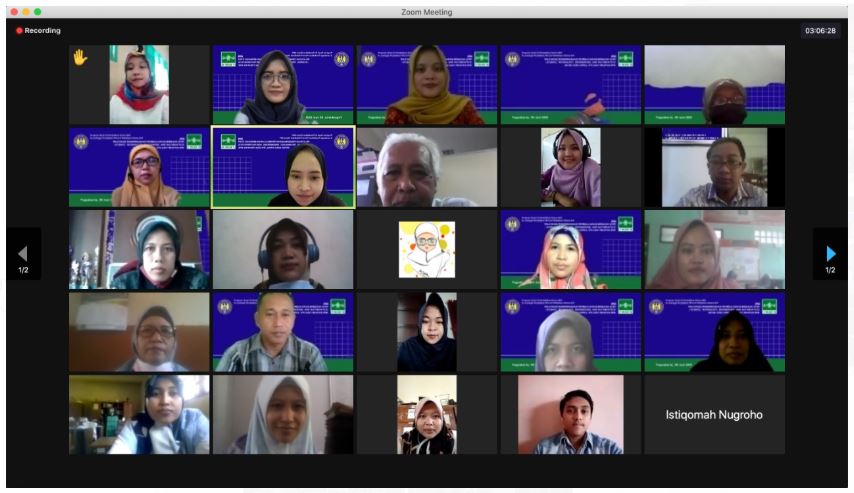 Bahasa Indonesia
Bahasa Indonesia English
English
You are here
Community Service: STEM Learning for Chemistry, Science, and Applied Science Vocational School Teachers

Based on the Tridharma of Higher Education, lecturers have an obligation to carry out teaching, research, and community service. One of the service programs carried out by the Chemistry Education Study Program is the STEM-based Chemistry Learning Development Training for Chemistry, Science, and applied SMK teachers. This activity was carried out through a Zoom Meeting on Wednesday, June 30, 2021, in collaboration with the Ma'Arif Nadhlatul Ulama Educational Institution of the Special Region of Yogyakarta. This activity is one of the efforts to improve the quality of chemistry learning. A total of 35 teachers from various vocational fields of expertise participated in this PPM activity. The activity began with remarks from the Chair of the MGMP IPA and Applied Educational Institutions Ma'Arif Nadhlatul Ulama Special Region of Yogyakarta, Mr. Agus Suharyanto, followed by the Coordinator of the Chemistry Education Study Program, Dr. Antuni Wiyarsi, M.Sc. The material presented consists of 1) Basic concepts of STEM Learning by Dr. Antuni WIyarsi, 2) STEM-based learning design by Mr. Heru Pratomo Al, M.Si, and 3) evaluation of STEM learning by Ms. Marfuatun, M.Si.
STEM-based learning training is carried out with a background of work demands that require the integration of components of Science Technology Engineering Mathematics (STEM) for 21st century human resources, so it is necessary to carry out a learning that demands creativity and problem-solving abilities from within students. Therefore, not only focusing on one discipline, STEM integrates various scientific perspectives which aims to prepare students to become qualified human resources. As for Projects and Applications in STEM-based learning, it is necessary to design a learning (RPP) with a certain model. STEM as an approach can be combined with one of the learning models such as Project based Learning with its syntax. Students are invited to design a project and realize its product with a background in understanding certain chemical concepts, such as stoichiometry, colloids, acids and bases, according to the field of vocational expertise. Of course, for the evaluation, a system that is developed for STEM-based learning is needed. There are no specific criteria for evaluating STEM learning, but teachers can focus on what competencies are learned, how students think, and how students understand and acquire skills, such as problem solving which is one of the competencies needed by 21st century human resources.
Through this PPM activity, it is hoped that it can provide inspiration for vocational chemistry teachers to design STEM approach learning and students are able to evaluate test results, analyze and interpret data, so that students' ideas can be communicated in innovative ways such as projects or prototypes for chemistry learning in schools. Vocational High School, so that students get real experience about the material they are learning according to their expertise competency.
Sistem Informasi
Kontak Kami
Program Studi Pendidikan Kimia
FMIPA Universitas Negeri Yogyakarta
Gedung Dekanat D.07 FMIPA UNY
Kampus Karangmalang Yogyakarta 55281
Telp. (0274)586168 Pes. 115
Email: pend_kimia@uny.ac.id
Copyright © 2024,
